An interview with aspiring para rider, Bryanna Tanase, on what it’s like in the beginning.
—With Para Coach Lisa Hellmer
EQuine AMerica: Welcome! Please introduce yourself to us.
Bryanna Tanase: My name is Bryanna Tanase. I am 21 years old. I am therapeutic rider.
What was your first encounter with horses? When did you know you had the “bug”?
My first encounter was in preschool or kindergarten during a trip to a farm. I went along with my sisters and there was a pony there whose name was Honey or Ginger or something. It was this cute little palomino, and I remember thinking “what is this creature?!” I was just fascinated by it. I knew I didn’t want to go anywhere else or do anything else, and then that was kind of it for me. Then on my fifth birthday, we had a petting zoo at my house and they had a pony! That was the first time I was on a horse and from that point on I thought to myself ‘Wow this is so cool! I really want to do this.’
Can you tell me about your disability? What are some of your daily struggles? What are some of the ways you are able to compensate for your disability?
My disability is cerebral palsy, which is brain damage that occurred before or during birth. It affects my movement, muscle tone, coordination, and all sorts of different things like that. Daily activities such as going to the bathroom, getting something from the fridge, and putting my clothes on are difficult. I can put my shirts on by myself, but I need help with my shoes. Anything that you do on a daily basis to get yourself ready is difficult for me. It’s my life. If there is a way I can do something on my own, I try to do it!
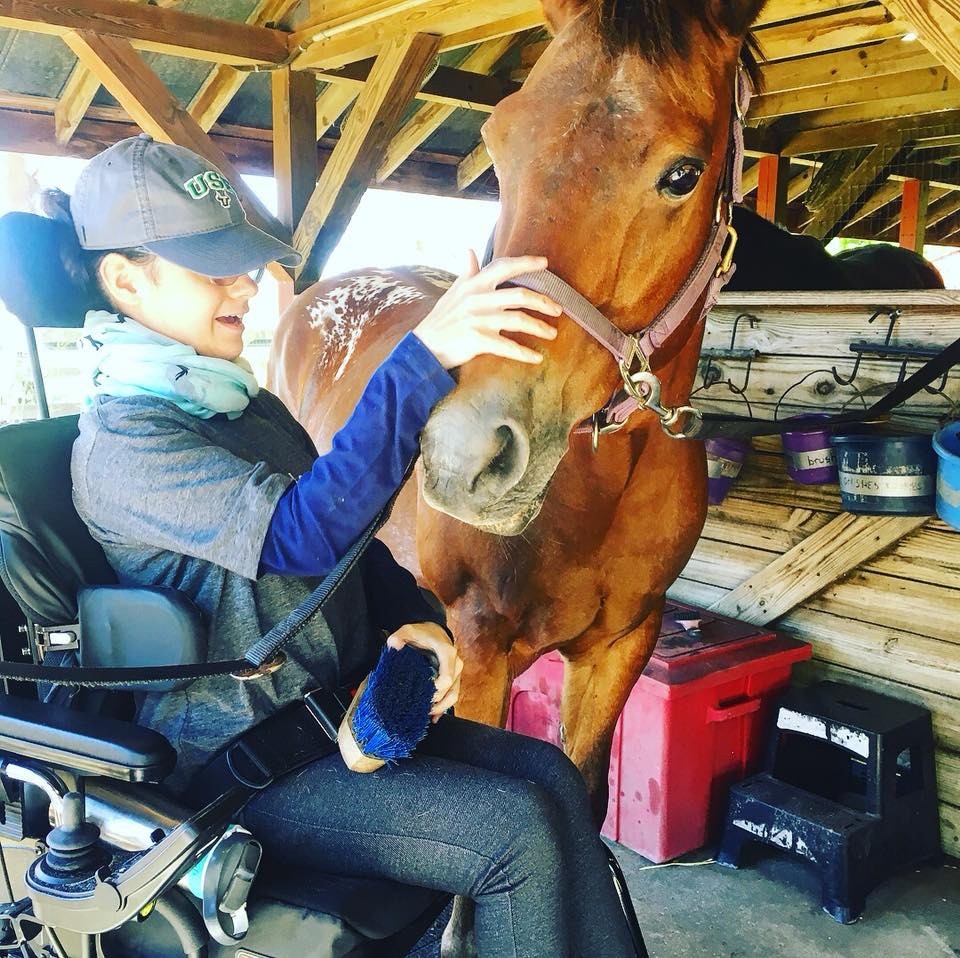
You are currently in a therapeutic riding program. How did you get started there? What’s that like?
I started my senior year of high school when my parents gave me vouchers for four lessons. Right away, from the first lesson, after meeting the horse and feeling how interactive it was compared to the things I had done in the past, I knew this was a place I wanted to be and something I wanted to do. To be able to ride the horse on my own and be independent was huge for me! Then the following year, I was enrolled in the program and I have been riding there ever since. It will be four years in April!
Each lesson is a little different. Sometimes I am lucky enough to have a private lesson, but most of the time I am in a group. The lessons vary depending on the riders and their disability, so the arena is set up a little different every time. With three other riders in there, we have to work within a smaller space, so I work on things like small circles or small obstacles. We aren’t all at the same level and can’t all work on the same things together. Everyone has a different level of mental and physical ability. The exercises are specific to our abilities.
Do you feel like your lessons work more on your balance and physical strength versus executing specific movements? Or does it vary?
I don’t feel like it is very technical, which is why I am interested in dressage. Right now it is more about building my foundation as a rider and developing my physical strength. I am eager to begin to transition from therapy to para.

How did find out about USEF para dressage?
I knew about it before I started as a therapeutic rider. I found it the way I find out most things about horses: through the internet. I spend a lot of time on my computer. I think I was just Googling one day because I was curious if there was anyone out there with a disability that was riding and doing anything in sport. That’s when I found para equestrian sport. I watched small clips on YouTube and then I watched a para rider do a test. I remember watching that test and thinking, ‘WOW this is so cool, I really want to do this!’
What are your short-term goals as an aspiring para dressage rider?
I need to learn how to sit the trot independently; I feel like I am building up to that. I really want to learn more about the technicalities of dressage. I want to learn more so I can be able to do these things on my own without someone having to tell me. I want to have that opportunity to take the horse and practice what I have been learning to make sure I actually know it without someone telling me. I also want to visit a show in the future. I haven’t had much exposure to that and I want to see one! I would also like to audit a clinic and see what that is like. My other big goal is to get classified as a para rider! That would really help me focus, knowing which grade I am in, so I can learn which specific movements I need to learn to ride a test. And I want to find out which kind of compensating aids I could use in competition. It is definitely a big goal for myself.
What are your long-term goals?
My long-term goals are to be on the show circuit and actually be doing dressage! I think I will have more knowledge and eventually show nationally at a USDF show. And in the future I would love to be able to ride for the USA as a para Olympic rider and represent the USA there.
If someone is interested in helping you accomplish your goals as a para dressage rider how can they help?
The biggest way that they can help is to be open. Let me try to do different things. Don’t look at my chair and let it be this scary thing. Throughout my time at my therapeutic riding center, I have been able to lead horses, groom, and help out. I don’t even need to ride to get experience. Even just having the opportunity to go to different barns is so valuable to me. I am actually capable of doing things. Just be open. We are like every other rider; we want to jump at every opportunity. They shouldn’t let the fact that we look different or are in a chair scare them from letting us try. We are like every other horse person and we just want to be in this environment.
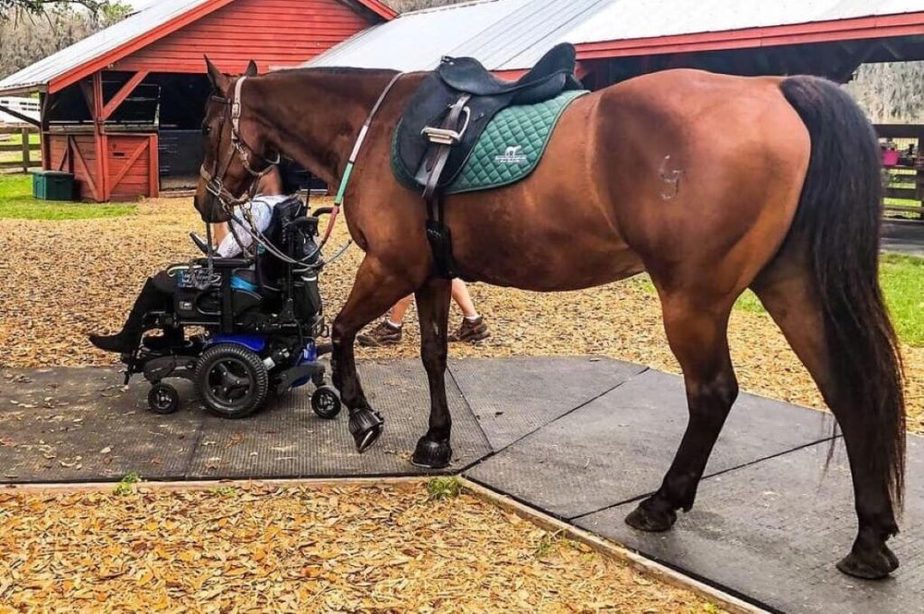
What is your next step towards transitioning from a therapeutic only rider, to a para dressage rider?
The next step is definitely getting classified. I need to contact USEF to see if I am scheduled for classification this winter. Then from there, hopefully I’ll be going out to a dressage trainer and a more dressage-centered environment because that is really the biggest thing I need right now—to learn more of the technical aspect of the sport. There is so much I don’t know about showing. I can read about it, but I need to see it and be there! It would also help me explain to my parents what this transition is all about and why I want to begin focusing more on dressage. I get a lot of my knowledge from the internet but I want that firsthand experience by being part of this.
Lisa Hellmer is working toward the Grand Prix with her Oldenburg “Aniko.” She graduated summa cum laude from Johnson & Wales University with a degree in equine business management and riding. As a former event rider, Lisa brings that experience into building EQuine AMerica’s Cavaletti Crossfit posters and her cross-training lessons, which you can find here. Recently, Lisa became a USEF Silver Para Dressage Coach and formed LCH Equestrian in Ocala, FL where she continues to focus on dressage, para dressage, and cross-training the dressage horse.



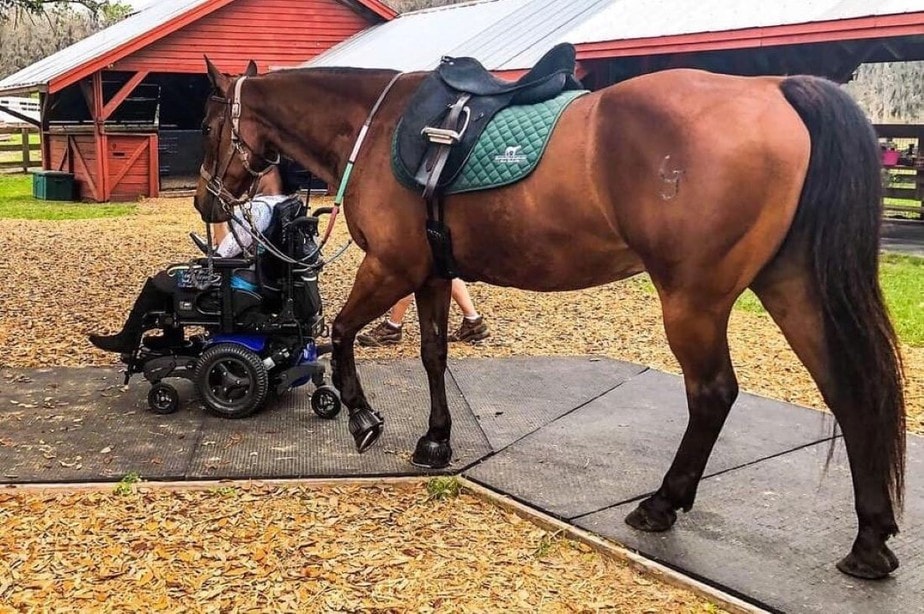

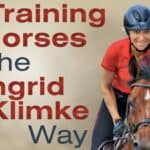
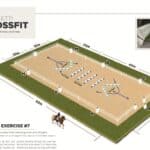
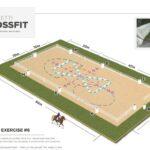
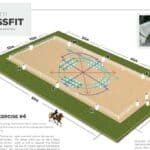
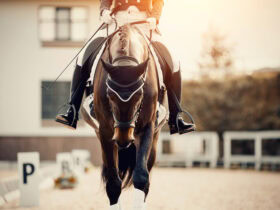
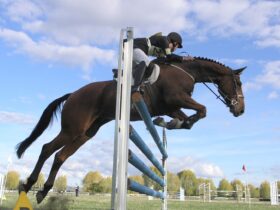
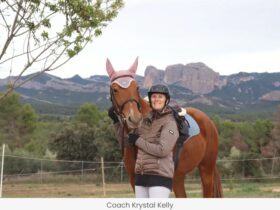
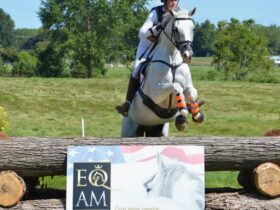
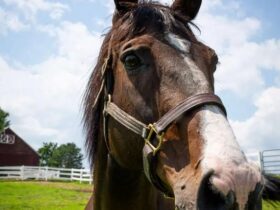
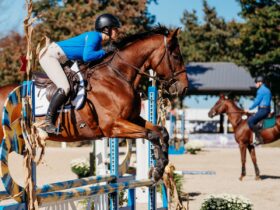
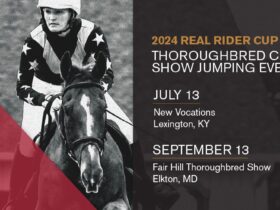
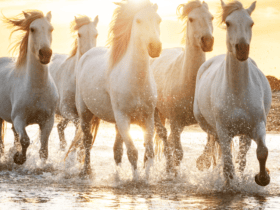
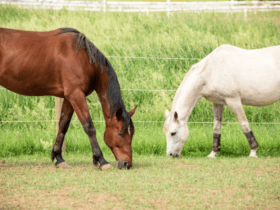
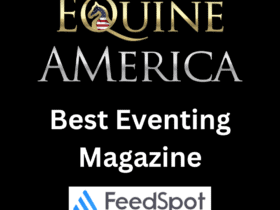
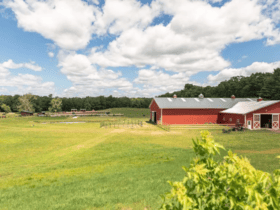


SOCIAL